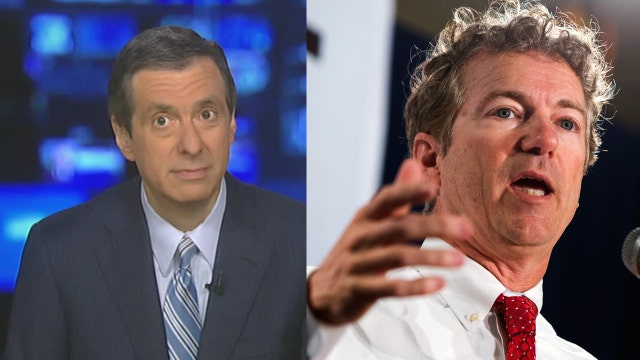Kurtz: Rand Paul blames the media
'Media Buzz' host Howard Kurtz weighs in on Rand Paul's battle with the media
Rand Paul is right about one thing—the media are on a Rand Paul Death Watch.
But I don’t know that publicly complaining about it does much good.
In fact, putting out a memo announcing that Paul is not dropping out only stokes the discussion that maybe he will.
It’s a rough period for the Kentucky senator, no question. He was hailed as a top-tier candidate when he got in. He was touted on Time’s cover as The Most Interesting Man in Politics. And after the summer of Trump and two lackluster debates, he’s been dwelling in single-digit land for quite some time.
I asked Paul about his struggling campaign a couple of weeks ago, and he said that “reports of my demise are somewhat exaggerated.”
Now he’s turning more aggressive, with this staff memo released the other day:
“There are some in the media who are pushing a false narrative that Senator Rand Paul (SRP) is on the ropes…
“While the media fixates on ad buys and fundraising, we are the only campaign organizing on campuses.
“The media plays up any drop in the polls SRP experiences, while ignoring his momentum and the precipitous decline of other candidates.”
Now SRP is suggesting that the press is deliberately out to screw him, and I don’t see any evidence of that. The Paul campaign raised just $2.5 million in the last quarter. There’s no way to spin that as anything other than anemic, especially for a guy who inherited his dad’s libertarian fundraising network.
Cherry-picking some positive poll signs, the memo says that SRP is “well within the criteria for the next debate--no question, he will be on the stage.”
Actually, there is a very real question. Paul is at 2.7 percent in the Real Clear Politics average—and the cutoff for this month’s CNBC debate is 2.5 percent. If he is booted from that prime-time stage, his campaign could go into a tailspin.
The memo adds that “you never read anything about Christie,” who is at 1.9 percent in the same average.
“The media is fixated on insisting that SRP should get out of the race even though he continues to win every time votes are counted and the polls show him on the rise.”
Now it’s true the media go haywire over polls months before a single vote has been cast. They declared John McCain dead in the summer of 2007, and he came back to win the GOP nomination.
But the memo carries a whiff of desperation—and I suspect is aimed not so much at journalists as at donors, who must be wondering whether Rand can go the distance. This is especially true considering that he is simultaneously running for reelection, and there is concern in Republican circles that a prolonged period of floundering could jeopardize his Senate seat.
Just as the Paul campaign was pleading that he’s not getting out, the Joe Biden camp was insisting that he might get in.
The press, of course, had been clamoring for Biden to get in, insisting he was about to decide any day, any hour—until the Democratic debate. After Hillary Clinton’s strong performance, the ardor immediately cooled: Biden won’t get in, he shouldn’t get in, the door has slammed, it’s too late.
So one of his best pals, former Delaware Sen. Ted Kaufman, wrote a memo designed to be leaked, saying the VP is well aware he must make a decision soon:
“If he runs, he will run because of his burning conviction that we need to fundamentally change the balance in our economy and the political structure to restore the ability of the middle class to get ahead…And what kind of campaign? An optimistic campaign. A campaign from the heart.”
Who knows at this point? Fox's Ed Henry reports that Biden is telling Democrats he'll likely jump in, but not for awhile.
To me, the bottom line is this: Nobody elected the press to shape the field.
We shouldn’t be prodding candidates to get in or get out. We should report aggressively on what they’re doing and their track records and backstage maneuvering. But we ought to get out of the prediction business—not least because, especially in this campaign, we have so often been wrong.






















